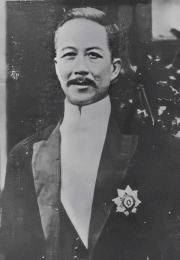Lau Chu-pak
Lau Chü-pak | |
|---|---|
 | |
| Unofficial Member of the Legislative Council of Hong Kong | |
| In office 5 September 1913 – 7 June 1922 | |
| Appointed by | Sir Francis Henry May Sir Reginald Edward Stubbs |
| Preceded by | Ho Kai |
| Succeeded by | Ng Hon-tsz |
| Personal details | |
| Born | 5 June 1867 Hong Kong |
| Died | 3 May 1922 (aged 54) Hong Kong |
| Lau Chu-pak | |||||||||
|---|---|---|---|---|---|---|---|---|---|
| Traditional Chinese | 劉鑄伯 | ||||||||
| |||||||||
Lau Chü-pak CMG JP (5 June 1867 – 3 May 1922) was a Hong Kong merchant and politician.
Lau Chu-pak was admitted to the Queen's College in the same year as Sun Yat-sen. He became a clerk at the Hong Kong Observatory and later went into business and became a comprador of the West Point Godown Company in 1888 and of A. S. Watson from 1893. Together with Ho Fook, they founded the Chinese General Chamber of Commerce in which he became the chairman of the chamber later on.
Along with Sir Robert Hotung, Lau was an early developer of the West Hung Hom (now East Tsim Sha Tsui) area in the 1890s.[1]
He held to various public posts such as the chairman of the Po Leung Kuk and Tung Wah Hospital, member of the District Watch Committee and the Sanitary Board.[2] He was appointed as Unofficial Member of the Legislative Council from 1913 until his death in 1922.[3]
He helped to found the University of Hong Kong by donating to the endowment fund in 1911. He later became the member of the University's Court between 1911 and 1914 and was honoured life member of the Court in 1914. He was member of the University Council from 1911 to 1922.
In 1921, Lau and fellow Legislative Councilor Ho Fook established the Society for the Protection of the Mui Tsai in defense of the mui-tsai system, a form of child slavery with the support of Chinese community leaders like Ts'o Seen Wan, Chow Shou-son and Ho Kom-tong.[4]
His son Lau Tak-po founded the Hong Kong and Yaumatei Ferry Company and the family is still in control of the company.
References
- ^ Smith, Carl T.; Hayes, James (1975). "Hung Hom (紅磡): An Early Industrial Village in Old British Kowloon". Journal of the Hong Kong Branch of the Royal Asiatic Society. 15: 318–324. ISSN 0085-5774.
- ^ Ure, Gavin (2012). Governors, Politics and the Colonial Office: Public Policy in Hong Kong, 1918–58. Hong Kong University Press. p. 239.
- ^ Mellor, Bernard. Lugard in Hong Kong: Empires, Education and a Governor at Work. Hong Kong University Press. p. 199.
- ^ Smith, Carl T. (1981). "The Chinese Church, Labour and Elites and the Mui Tsai question in the 1920s". Journal of the Hong Kong Branch of the Royal Asiatic Society. 21: 91–113. ISSN 0085-5774.
